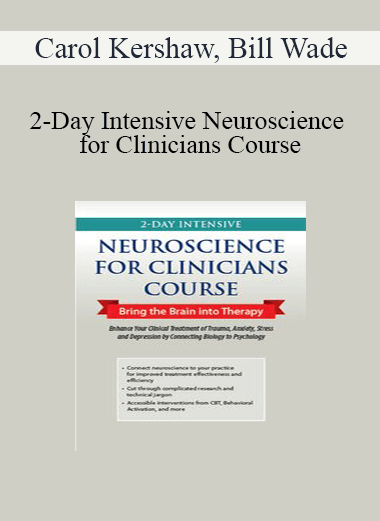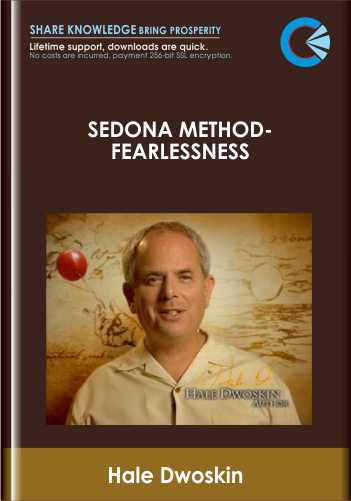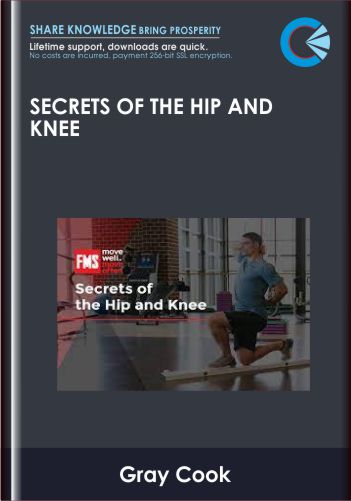Available only $83, Carol Kershaw, Bill Wade – 2-Day Intensive Neuroscience for Clinicians Course: Bring the Brain into Therapy Course is a digital course. You can access to learn every time. We can make the most of our free time. Let combining study and work, or balance with daily life becomes much simpler at wecor.site!
- Faculty:
- Carol Kershaw | Bill Wade
- Duration:
- 12 Hours 13 Minutes
- Format:
- Audio and Video
- Copyright:
- Nov 08, 2018
Description
Outline
Motivate and Engage Your Clients with Neuroscience
- Simple explanations on brain structure and function
- The neurobiology of specific disorders
- You can change – neuroplasticity and the potential for transformation
Teach Clients About Brain Health
- Sleep quality and mood
- Nutrition
- The habit of exercise
- The value of social support
- Detrimental impacts of stress
How the Neurobiology of Attachment and Relationships Informs Your Clinical Practice
- Neurobiological basis of attachment
- How relationships impact our brains
- Mirror neurons, empathy and connecting with others
- Oxytocin and the individual self
- How attachment style impacts your clients’ relationships
- Attachment and attunement in the therapeutic relationship
Trauma: Connect the Neurobiology of Trauma to Treatment
- Childhood trauma and the trajectory of brain development
- The fight/flight/freeze response
- Implicit memory and the limbic system
- Clinical techniques:
- Trigger identification
- Exposure
- Guided imagery
- Grounding strategies
Anxiety and Stress: Regulate Emotion and Interrupt Anxious Rumination
- How the brain is organized – and how it organizes
- Homeostasis, stress pathways and stress responses
- The resting state – the parasympathetic nervous system and mental health
- Emotional and thinking circuits, and perception of control – and why this matters to therapy
- Clinical techniques:
- Mindful awareness of emotions – labeling emotions
- Interventions that shift focus away from anxious rumination
- Interrupt worry patterns with physical exercise
- Diaphragmatic breathing exercises to regulate emotion
- Resiliency – susceptibility to stress-based damage
Depression: Techniques to Intervene in the Downward Spiral
- The limitations of medication-based treatment
- Brain circuits involved in positive and negative emotion
- The brain’s negativity bias and depression risk
- The amygdala in the depressed brain
- The downward spiral
- Reconstructed memories
- Clinical techniques:
- Behavioral Activation – get out of your head and into your life
- Cognitive therapy tools – problem solving skills in the treatment plan
- The psychology of obtainable goals
- Self-compassion as a buffer to depressive symptoms
Neurocognitive Health Checkup
- Test of Variable Attention (TOVA)
- Mood evaluation
- Biochemical dysfunction and depression
- Measuring memory
- Brain injury
- Neurofeedback
Simple Biofeedback Tools for Regulating Physiological Responses
- Physiological control and psychology
- Biofeedback games
- Controlled breathing
- Heart Rate Variability
- EEG biofeedback training
Distractibility and the Brain: Cognitive Costs in the Land of Information Overload
- The myth of multitasking – Multitasking vs. task switching
- Synaptic pathways, mental states, memory and learning
- The pre-frontal cortex and flexible goal directed behavior
- Teach clients coping strategies that can:
- Reshape detrimental behavioral patterns
- Decrease distractions
- Build organizational and time management skills
The Neuroscience of Positive Psychology
- The science behind gratitude
- Overcome barriers to practicing gratitude
- Easy-to-use gratitude exercises
- The neuroanatomy of forgiveness
- Strengths-based interventions
- Flow states
- Merge action with awareness
- Flow, the prefrontal cortex, and the inner critic
- Research limitations of positive psychology approaches
The Limitations of Neuroscientific Research and Potential Risks
- fMRI imaging
- Things to keep in mind regarding animal studies
- Simple explanations for complicated processes
- Research limitations, and treatment risks
Faculty
Carol Kershaw, Ed.D. Related seminars and products: 5
Carol Kershaw, Ed.D., is a licensed psychologist and co-director of the Milton Erickson Institute of Houston and co-author of Brain Change Therapy: Clinical Interventions for Self Transformation (2012 WW Norton), co-author of The Worry Free Mind (Career Press) and author of The Couple’s Hypnotic Dance (Brunner/Mazel). She is board certified in Neurofeedback, a member of the American Psychological Association, and approved consultant for the American Society of Clinical Hypnosis. She is an international trainer and is a frequent presenter in the states on the most cutting edge interventions based in neuroscience and hypnosis. Carol has been featured on ABC, CBS, Fox and NBC for her cutting-edge work.
Speaker Disclosure:
Financial: Carol Kershaw receives royalties as an author for W.W. Norton and Company. She receives a speaking honorarium from PESI, Inc.
Non-financial: Carol Kershaw has no relevant non-financial relationship to disclose.
Bill Wade Related seminars and products: 3
Bill Wade, M.Div., LPC, LMFT is a licensed professional counselor and marriage and family therapist, author and international trainer. Co-director of the Milton Erickson Institute of Houston he is also a co-author of Brain Change Therapy: Clinical Interventions for Self-Transformation and The Worry Free Mind: Train Your Brain, Calm The Stress Spin Cycle, and Discover a Happier, More Productive You. Bill has taught extensively in the states on neuroscience and has also taught meditation and given Dharma lectures at various Buddhist temples.
Speaker Disclosure:
Financial: J. William Wade maintains a private practice. He receives royalties from W.W. Norton, Amazon Books and CDS. He receives a speaking honorarium from PESI, Inc.
Non-financial: J. William Wade is a member of the American Association for Marriage and Family Therapy; American Counseling Association; and Texas Association for Marriage and Family Therapy.
[Instant Download] – Immediately deliver the download link after receiving the payment
Purchase the Available only $83, Carol Kershaw, Bill Wade – 2-Day Intensive Neuroscience for Clinicians Course: Bring the Brain into Therapy Course course at the best price at Wecor and unlock a world of knowledge at the best price. Upon completing your purchase, you'll receive instant access to the downloads page, allowing you to download all associated course materials. Additionally, we'll send a download notification email directly to your inbox.
Unlock your full potential with Available only $83, Carol Kershaw, Bill Wade – 2-Day Intensive Neuroscience for Clinicians Course: Bring the Brain into Therapy Course courses. our courses are designed to help you excel.
Our Available only $83, Carol Kershaw, Bill Wade – 2-Day Intensive Neuroscience for Clinicians Course: Bring the Brain into Therapy Course courses are thoughtfully designed to help you unleash your full potential and excel in your chosen field. Don't wait; take the first step towards greatness by purchasing our courses today. We offer a seamless and secure transaction experience, ensuring your peace of mind throughout.
Rest easy knowing that your financial information is protected by our trusted payment gateways, Stripe and PayPal. Stripe, renowned for its robust security measures, provides a safe and reliable payment process with encrypted technology that keeps your sensitive data confidential. PayPal, a globally recognized payment platform, adds an extra layer of security through its buyer protection program, ensuring your financial details are safeguarded.
Is it secure? to Use of?
- Your identity is treated with utmost confidentiality, and we do not share your information with anyone. Purchasing theAvailable only $83, Carol Kershaw, Bill Wade – 2-Day Intensive Neuroscience for Clinicians Course: Bring the Brain into Therapy Course course is entirely safe.
- 100% Safe Checkout Privateness coverage
- Secure Communication and Encryption of Sensitive Data
- Card numbers are encrypted using AES-256, and transmitting card numbers occurs in a separate hosting environment, guaranteeing the security of your data.
Course Delivery:
- Upon successful payment for the “Available only $83, Carol Kershaw, Bill Wade – 2-Day Intensive Neuroscience for Clinicians Course: Bring the Brain into Therapy Course course”, Most of the products will come to you immediately. But for some products were posted for offer. Please wait for our response, it might take a few hours due to the time zone difference.
- If any delays occur, please be patient. Our technical department will process the link shortly after, and you'll receive notifications directly via email. We appreciate your understanding.
What Shipping Methods Are Available?
- You will receive a download link in the invoice or YOUR ACCOUNT.
- The course link always exists. use your account to login and download the Available only $83, Carol Kershaw, Bill Wade – 2-Day Intensive Neuroscience for Clinicians Course: Bring the Brain into Therapy Course course whenever you need.
- You only need to visit a single link, and you can get all the Available only $83, Carol Kershaw, Bill Wade – 2-Day Intensive Neuroscience for Clinicians Course: Bring the Brain into Therapy Course course content at once.
- You can do your learning online. You can be downloaded for better results and can study anywhere on any device. Make sure your system does not sleep during the download.
How Do I Track Order?
- We always notice the status of your order immediately after your payment. After 7 days if there is no download link, the system will automatically complete your money.
- We love to hear from you. Please don’t hesitate to email us with any comments, questions and suggestions.















